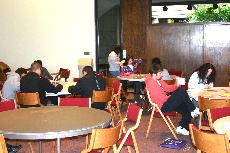Gabfest discusses curriculum requirements

April 2, 2008
Nick Proctor, associate professor of history and History Department chair, hosted the Simpson Gabfest forum Thursday, March 27. The topic of discussion for the event was the question “what makes a full, well-rounded liberal arts education? “
Students who attended the forum were polled on which classes they believed should be required. The top two subjects voted most crucial to the core curriculum were religion and history. 100 percent of attendees voted in favor of the religion curriculum, with 90 percent in favor of history.
Social science received 80 percent votes of approval and the minority perspective obtained 60 percent. Both literature and the natural sciences were voted for by 50 percent of the students.
Many students who attended the forum thought studying abroad and May Term classes should be made optional.
“I wasn’t surprised that what the room came up with was a streamline version of the Cornerstone requirements,” Proctor said.
When students were polled over whether or not having a fine arts perspective should be mandatory, only 25-30 percent supported the idea. Students at the event believed the fine arts perspective should only be made mandatory for music majors.
“I think that our fine arts departments are strong, but I was surprised very few students stood up for making it one of our cornerstone requirements,” Proctor said.
Freshman Megan Mosell, a music and biology major, supports having a fine arts perspective.
“Music should be required, because it gives you a wider range,” Mosell said. “I think that music class should be taken for a cornerstone. We’ve taken it throughout school, why not continue?”
Senior Benjamin Williams, a history major, stood up for promoting the communications aspect as many students did. One group decided that both writing and public speaking should be emphasized in all aspects of learning, since they are both skills fundamental to all departments.
“I believe that…a basic communications background is important going out into the real world,” Williams said.
Another question that also came up in discussion was whether or not LAS should be a mandatory class. Many participants believed that LAS was unnecessary because many students do not always end up sticking with their declared major as incoming freshman.
Instead, participants saw the first couple years of college as a time to test out their strengths and interests and whether they have LAS or not did not seem to be a huge influence on whether they actually decide to stick with their incoming major.
“[LAS] should be required if it’s going to pertain to your major,” Mosell said, “Whether or not you’re going into math, you should learn to handle your finances.”
As far as class content, Mosell agreed with an idea which came up at Gabfest, of incorporating some kind of financial management into our LAS course, noting financial management can be helpful for any major, especially before students head out into “the real world.”












